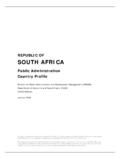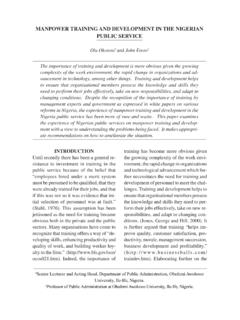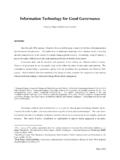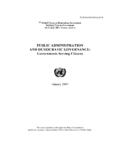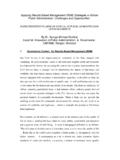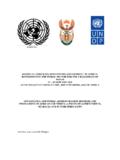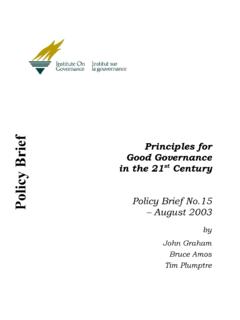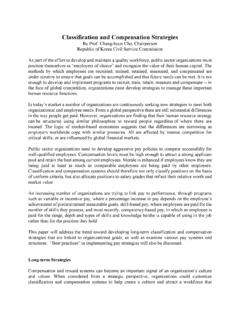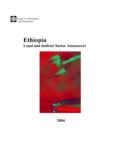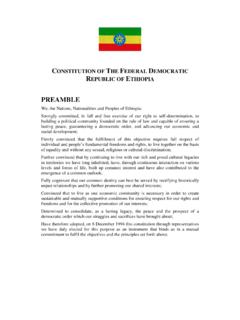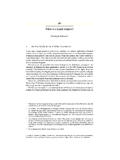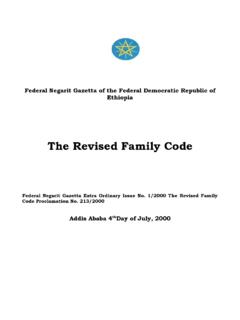Transcription of Striving for Good Governance in Africa - United Nations
1 United Nations . ECONOMIC COMMISSION FOR Africa . Striving for good Governance in Africa ECA Africa Governance Report United Nations . ECONOMIC COMMISSION FOR Africa . This presentation will: Introduce the ECA project Measuring and Monitoring Progress towards good Governance in Africa . Present a synopsis of the Africa Governance Report which is a synthesis of the main findings and major challenges to good Governance in Africa , based on the Governance survey in 28 countries Present ECA's Action Plan for improving good Governance in Africa Discuss the way forward and how ADF deliberations can enrich the AGR. ECA Africa Governance Report United Nations . ECONOMIC COMMISSION FOR Africa . Main objectives of the Governance Project To identify institutional Create a dynamic and capacity deficits for mechanism for periodic policy making and cross-national recommend strategies assessments of for intervention Governance in Africa AGR.
2 Develop a broad Gauge citizens' opinion on consensus on the key the state of Governance in components and their respective countries indicators of good and communities Governance ECA Africa Governance Report United Nations . ECONOMIC COMMISSION FOR Africa . Scope of the Governance Project Political Governance Economic Management and Corporate Governance Institutional Effectiveness and Accountability Human Rights Capacity Building ECA Africa Governance Report United Nations . ECONOMIC COMMISSION FOR Africa . ECA Governance Project Methodology Expert Panel Household survey Desk study Seeks the opinion of Seeks the Seeks factual a panel of around perception of the information & data 100 national experts general public through investigation 28 country African 28 country Governance profiles reports Report ECA Africa Governance Report United Nations . ECONOMIC COMMISSION FOR Africa . Project countries and phases 72% of Africa 's Benin Botswana Mauritius Morocco population Burkina Faso Mozambique Cameroon Namibia covered Chad Egypt Niger Nigeria Ethiopia Rwanda Gabon Senegal Gambia South Africa 1st Phase Ghana Swaziland Kenya Tanzania 2nd Phase Lesotho Uganda 3rd Phase Malawi Zambia Mali Zimbabwe ECA Africa Governance Report United Nations .
3 ECONOMIC COMMISSION FOR Africa . Overall message of the AGR. Overall, Governance is getting better in Africa , but key challenges remain Political Performance indicators rank highest on average ( voter turnout, competitiveness of the political system, legitimacy of the political framework). Decentralization, tax evasion and corruption indicators rank lowest ECA Africa Governance Report United Nations . ECONOMIC COMMISSION FOR Africa . Political Governance Key Findings Adherence to constitutionalism is getting stronger Democratic and multiparty elections are becoming the only acceptable means of alternation of power Political space is becoming more liberalized The political system is becoming more inclusive and diverse CSOs participation is stronger and they are more active in the decision making process ECA Africa Governance Report United Nations . ECONOMIC COMMISSION FOR Africa . Political Governance Key Findings (continued).
4 Voter participation is very high in most countries Political parties are becoming more legitimate and flourishing but remain weak and largely ineffective in many countries The electoral process and institutions are becoming more transparent and credible There are improvements in human rights in Africa but progress remains tenuous ECA Africa Governance Report United Nations . ECONOMIC COMMISSION FOR Africa . Competitiveness of the political system Nigeria Mauritius Benin Burkina Mali Lesotho Namibia Tanzania Mozambique Gambia Uganda Morocco Ethiopia Tchad Gabon Botswana Cameroon Source: Household survey 0% 20% 40% 60% 80% 100%. ECA Africa Governance Report United Nations . ECONOMIC COMMISSION FOR Africa . Number of registered political parties 160. 140. 120. 100. 80. 60. 40. 20. 0. South Mali Ethiopia Chad Senegal Kenya Burkina Morocoo Nigeria Botswana Africa Faso ECA Africa Governance Report United Nations .
5 ECONOMIC COMMISSION FOR Africa . Political Governance Key Challenges Protecting the rights of women and children remains a key Governance challenge in Africa The electoral commissions need to be more independent and better resourced Law enforcement agencies continue to violate the rights of the people in many countries Opposition parties lack access to resources and security which undermine the effectiveness of the electoral process CSOs need to improve their internal Governance ECA Africa Governance Report United Nations . ECONOMIC COMMISSION FOR Africa . Opposition parties are still weak Experts stating that the opposition has no or only a weak 100% influence on government policy, programs and legislation . 90%. 80%. 70%. 60%. 50%. 40%. 30%. 20%. 10%. 0%. Ethiopia Swaziland Mali Tchad Tanzania Mauritius Burkina Kenya Gambia Malawi ECA Africa Governance Report United Nations . ECONOMIC COMMISSION FOR Africa .
6 CSO influence on government policies and programs is still weak Gabon Experts stating that CSOs Mauritius have no or only a weak Nigeria influence on government policy, programs and Niger legislation . Mali Cameroon Gambia Swaziland Ethiopia Egypt 0% 10% 20% 30% 40% 50% 60% 70% 80%. ECA Africa Governance Report United Nations . ECONOMIC COMMISSION FOR Africa . Economic Management & Corporate Governance Key Findings Commitment to macroeconomic stability and sound economic management on the increase Better public financial management with a more equitable tax system, smaller budget deficits, and better resource mobilization The Medium Term Expenditure Framework (MTEF). increasingly adopted to enhance budgetary discipline and efficiency, but confronted by several challenges Poverty reduction is gaining more focus with PRSPS, but outcomes are limited ECA Africa Governance Report United Nations . ECONOMIC COMMISSION FOR Africa .
7 Economic Management & Corporate Governance Key Findings (continued). A more conducive environment for private sector development exists, but several hurdles remain and investment inflows are still limited Monetary and financial institutions ( Central Bank). are being accorded greater independence and Striving for better integrity and accountability Corruption continues to undermine socio-economic growth and development ECA Africa Governance Report United Nations . ECONOMIC COMMISSION FOR Africa . Partnership of public and private sectors 90%. Experts stating that the private and public sectors 80% are effective partners in development . 70%. 60%. 50%. 40%. 30%. 20%. 10%. 0%. South Africa Botswana Namibia Malawi Ghana Mozambique Mauritius Morocco Mali Senegal ECA Africa Governance Report United Nations . ECONOMIC COMMISSION FOR Africa . Economic Management & Corporate Governance Key Challenges Lack of peace, order and stability in many countries are formidable obstacles to good economic planning, capital inflow and economic growth Need to reduce the cost and procedure of doing business in many African countries and enforcing commercial/contract laws Greater need for transparency and availability of information on the design and implementation of economic policies Poor infrastructural development and poor service delivery Fight against corruption must be concerted and requires both domestic and international cooperation ECA Africa Governance Report United Nations .
8 ECONOMIC COMMISSION FOR Africa . Corruption is still a major challenge Household survey Traditional rulers responses on public Elected legislators/ officials most likely to councillors take bribes (cross- Public prosecutors country average). Judges Tax officials Police 0% 10% 20% 30% 40% 50% 60% 70%. ECA Africa Governance Report United Nations . ECONOMIC COMMISSION FOR Africa . Institutional Effectiveness and Accountability Key Findings Institutional checks and balances are increasingly recognized and improving in Africa The excessive powers of the Executive, hitherto the norm, are increasingly being checked The Legislature and Judiciary are becoming more independent but there are capacity deficiencies Traditional or customary courts remain resilient and popular in many African countries ECA Africa Governance Report United Nations . ECONOMIC COMMISSION FOR Africa . Institutional Effectiveness and Accountability Key Findings (continued).
9 Service delivery in many countries remains poor, but is moderately improving in some Public-private sector partnerships are emerging to increase choice and access to services The number of private owned media is growing in most countries providing alternative voices and institutional checks in Governance The civil service remains weak with poor performance in many countries ECA Africa Governance Report United Nations . ECONOMIC COMMISSION FOR Africa . Constitutional checks & balances Very few/no checks &. balances 17% Full/ significant checks &. balances 62%. Limited checks & balances 21%. ECA Africa Governance Report United Nations . ECONOMIC COMMISSION FOR Africa . Institutional Effectiveness and Accountability Key challenges Strengthening the human and resource capacities of the Legislature, the Judiciary and non-state actors Providing better access to justice and improving the independence of the Judiciary Improving the quality, access and affordability of public services, especially for the poor ECA Africa Governance Report United Nations .
10 ECONOMIC COMMISSION FOR Africa . Institutional Effectiveness and Accountability Key challenges (continued). Improving the independence and effectiveness of oversight and regulatory bodies (ombudsman, public complaints commission, human rights and anticorruption commissions, auditors- general). Better integration of traditional institutions into the Governance system and enhancing their capacity, accountability and performance Reform and strengthening of the civil service for efficiency and effectiveness ECA Africa Governance Report United Nations . ECONOMIC COMMISSION FOR Africa . 60. Public service delivery is poor 50. 40. 30. 20. 10. 0. Access to clean water Access to affordable Access to electricity Access to waste Access to employment housing disposal Source: Household survey ECA Africa Governance Report United Nations . ECONOMIC COMMISSION FOR Africa . Capacity Deficit and Governance in Africa A major finding from the Africa Governance Report is the prevalence of capacity deficits in Governance institutions in Africa , which are of human, material and institutional dimensions.
